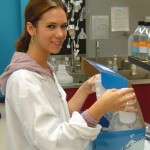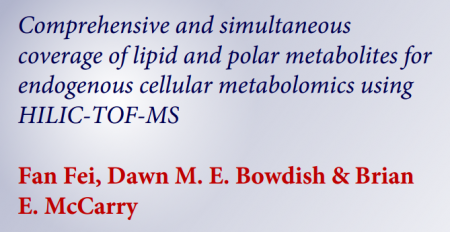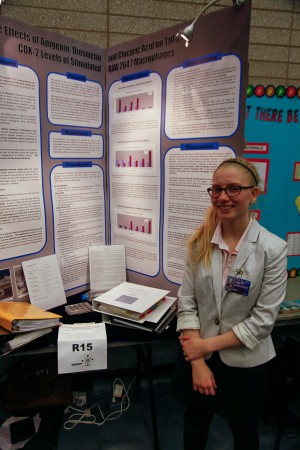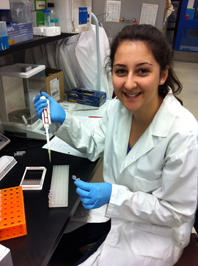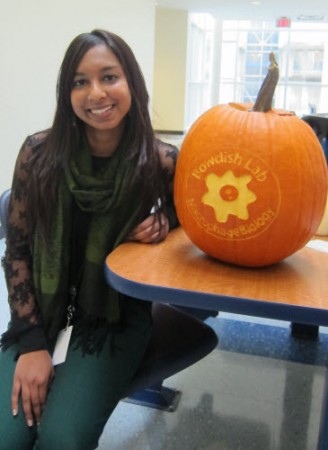Jessica Wallace (Sept 2013-Apr 2014) was a Life Sciences student who took Dawn’s HTHSCI 4II3 (Advanced Immunology) class. She was such an engaged student that despite being full to the rafters, she became the Bowdish lab’s 7th undergraduate student in the 2013/14 school year. She worked with Dr. Chris Verschoor to study the role of circulating bacterial products in age-associated inflammation. She has been accepted to McMaster’s Medical Sciences Graduate Program and will be working with Dr. Deborah Sloboda (Biochemistry) as an MSc student in Sept 2014. Congratulations Jessica!
Author Archives: Dr. Dawn M. E. Bowdish
Alumnus update: Prashant Bharadwaj accepted to John Hopkins University for graduate school.
Prashant Bharadwaj (Summer 2013) was an undergraduate from the Indian Institute of Technology who won a MITACS summer studentship to work in the Bowdish lab discovering novel signalling motifs in macrophage scavenger receptors. He will be joining John Hopkins as a graduate student in September 2014. Way to go Prashant!
Alumnus update: Sarah Chauvin (Thesis student May 2010 – September 2011) is accepted to Medical School!
More funding for Lung Research: The Kayla Baker Award
Last year I had the incredible honour of winning the Pfizer-Lung Association award (+Canadian Lung Association ) research award for my work on preventing pneumonia in older adults. I got to attend the Breathe Gala, a major fundraising effort for the Ontario Lung Association. I was absolutely humbled to be standing beside these three women, Helene Campbell, double lung transplant recipient and idiopathic pulmonary fibrosis patient, Ann Marie Cerato, lung cancer survivor and Kayla Baker who had pulmonary fibrosis and at that time was waiting for a lung transplant. These woman who had or were battling incredibly devastating lung disease were there with a common message “More money for lung research”. I really couldn’t believe how selfless they were, as they were well aware of how slow basic research can be, and how they might not see changes in their lifetime. They knew, as all of us in lung health know, that lung research is underfunded, especially when one considers how much the economic and personal costs are and were using their voices and stories to rally the cause and without more funding health outcomes for people with pulmonary fibrosis, lung cancer or lung infections would be grim. I was inspired by them and have tried my best to take up the cause and become an advocate for lung health.
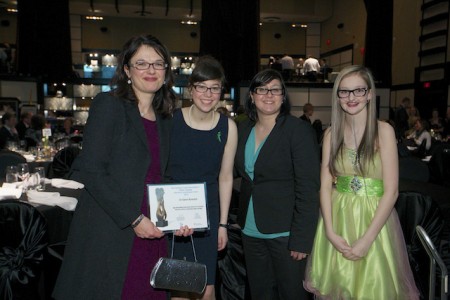
Dawn standing beside the real heros of the event, Helene Campbell, double lung transplant recipient and idiopathic fibrosis patient, Ann Marie Cerato, lung cancer survivor and Kayla Baker sarcoidosis patient waiting for a lung transplant.
I think the whole lung family was devastated when Kayla passed away last year and inspired by her mother Susan’s commitment to continue raising money for lung research.
Below is a bit about Kayla’s story and a link to fund a research award in her name. I was proud to donate and I hope you will consider it to, even $5 or $10 dollars will add up and send Kayla’s message “More funding for lung research.”
About Kayla
Kayla Baker was a true lung warrior…through her unwavering commitment to building awareness of the importance of lung research.
Kayla Baker was diagnosed with Pulmonary Fibrosis, a rare lung disease at the age of 11. This disease is the consequence of chemotherapy she received when she battled cancer, starting at the age of 18 months old. This is when Kayla began a long relationship with SickKids Hospital, becoming a young ambassador for the hospital, helping to generate awareness for organ donation and the need for improvements in medical research and patient care.
A couple years later, we were privileged at the OLA to have Kayla and her mother Susan enter our lives. Kayla became a true lung champion, committing to the cause and speaking publicly about her condition and the need for greater investments in lung research. More recently, Kayla and her mother were featured in a successful national direct mail campaign. She never tired of speaking out on her fight for life in the hopes of helping others. And when Kayla spoke, people listened.
Sadly, Kayla passed away this past Christmas. She leaves behind a memory for all those who have known her of a young girl that personified courage and bravery…and someone that continues to inspire and generate hope.
The Kayla Baker Research Award is being established in her memory.
“Comprehensive & simultaneous coverage of lipid and polar metabolites for endogenous cellular metabolomics using HILIC-TOF-MS” 2014. Fei et al. Anal Bioanal Chem.
Catherine Bowman cleans up at the 2014 Bay Area Science and Engineering Fair!
Catherine Bowman, a grade 10 student from St. Mary’s Catholic Secondary in Hamilton, joined the Bowdish lab under the mentorship of Avee Naidoo (MSc candidate) and Kyle Novakowski (MSc student) recently to work on a project entitled “The Effects of Apigenin, Diosmetin and Chicoric Acid on TNF-Alpha and COX-2 Levels of Stimulated RAW 264.7 Macrophages.”
She received a number of awards including a BASEF gold medal, Cancer Assistance Programme Award – First, Hillfield Strathallan College Awards of Excellence- Biological Sciences Award, Hamilton Association da Vinci Award, Drs. Ranjan Sur and Monalisa Sur Award, Pinnacle Best in Fair and the ArcelorMittal Dofasco Pinnacle best-in-fair award at the Bay Area Science and Engineering Fair for her project. She’ll be presenting her work at Canada-wide and the International Science Fair!
To read the article from the Hamilton Spectator, click here.
Funding from the province of Ontario supports two new graduate students!
Bowdish lab receives funding from the province of Ontario to train two new graduate students! Avee Naidoo (MSc) and Dessi Loukov, who will be starting a PhD in Sept 2013, will be studying how age-associated inflammation predisposes older adults to pneumonia.
For full details on the award for Dawn’s proposal “Interplay between inflammation and impaired anti-bacterial immunity in the elderly.”
http://iidr.mcmaster.ca/IIDR-news/ERAs-2014.html#.UzXGj_ldWSo
Whelan et al. The Loss of Topography in the Microbial Communities of the Upper Respiratory Tract in the Elderly. Ann Am Thorac Soc. 2014 Mar 6.
Whelan FJ, Verschoor CP, Stearns JC, Rossi L, Luinstra K, Loeb M, Smieja M, Johnstone J, Surette MG, Bowdish DM. The Loss of Topography in the Microbial Communities of the Upper Respiratory Tract in the Elderly. Ann Am Thorac Soc. 2014 Mar 6.
This paper describes how the microbial communities of the anterior nares and nasopharynx change between adults and the elderly.
Dawn Bowdish & Chad Steele elected Vice Chairs for the 2016 Gordon conference on Acute Respiratory Infections!
I attended the Gordon conference on “Acute Respiratory Infections” in Barga, Italy. It was an exceptional meeting, with lots of great science and surprisingly I was elected with Chad Steele to be vice-chairs of the 2016 conference and chairs of the 2018 conference! I’m really excited to be part of this amazing group of researchers. Look how enthusiastic Chad & I are. 2016 is in Galveston, Texas & one of my goals is to have that place swimming with Canadians. It would be almost impossible to match the quality of this year’s conference but Chad and I will certainly do our best.
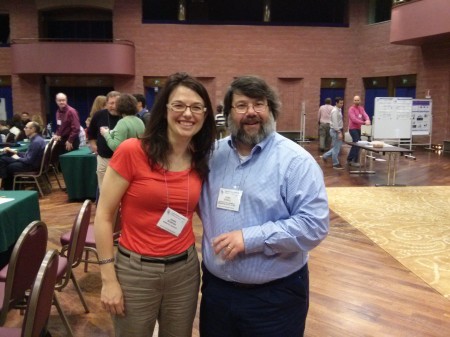
Dawn Bowdish & Chad Steele are excited to be elected Vice Chairs of the 2016 Gordon conference on Acute Respiratory Infections and Chairs of the 2018 meeting!
For a photo of all the attendees at the conference – click here -> grcphoto_2014_bioacute
PradhuDas et al. Standardizing Scavenger Receptor Nomenclature. J Immunol. 2014 Mar 1;192(5):1997-2006.
PrabhuDas M, Bowdish D, Drickamer K, Febbraio M, Herz J, Kobzik L, Krieger M, Loike J, Means TK, Moestrup SK, Post S, Sawamura T, Silverstein S, Wang XY, El Khoury J. Standardizing scavenger receptor nomenclature. J Immunol. 2014 Mar 1;192(5):1997-2006. doi: 10.4049/jimmunol.1490003.


